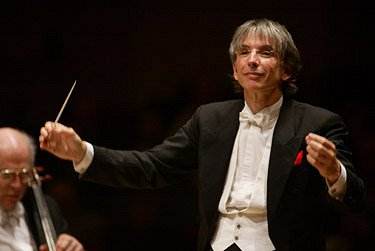S & H Concert Review
Anton Bruckner, Symphony No.9, Te Deum Turid Karlsen (sop), Natascha Petrinsky (mezzo), Anthony Dean Griffey (ten), Peter Rose (bass); London Symphony Orchestra & Chorus, Michael Tilson Thomas (con); Barbican Centre, 2nd November, 2003 (AR)
Michael Tilson Thomas is not a conductor I would associate with Anton Bruckner but tonight’s LSO concert proved me wrong, with the conductor showing he has a great instinct and feeling for the composer, in what was an extraordinarily powerful and brutally direct performance of his Ninth Symphony in D minor.The opening bars of the first movement were sustained and gripping with Tilson Thomas judging the pulse and dynamics to perfection. His conception was monumental, adopting a wide dynamic range but one which was never sensational or distorted to extremes. The first explosive climax had incredible weight from brass and timpani instilling a sense of terror. This was contrasted with the pulsating and reflective lyrical passages where the LSO strings played with warmth and grace. The tempi were broad but never dragged, with the conductor allowing the music to unfold organically at its own pace, almost as if he were not there: letting the music speak in this self-effacing way is the art of great conducting. As the movement marched forward the tension and drama increased with the concluding passages sounding truly menacing with incisive brass and timpani playing with overwhelming power.
The central Scherzo had a manic mixture of horror juxtaposed with humour, with the pounding lower brass and timpani having menacing weight contrasted by the more lyrical sections for pizzicato strings which had a lilting grace. The conductor brought out the metallic dissonances and machine-like rhythms which made the work sound both primordial as well as ultra modern, pointing towards Bartok.
The Adagio opened with a sea of solemn strings expressing anxiety tinged with anguish. Here the LSO violins were in a class of their own, sounding superior to those of the current BPO and VPO in sheer sweetness of tone and weight. Tilson Thomas is the only conductor apart from Klemperer that I know of who is able to sustain the repeated note of the flute (which, under Klemperer actually sounds like morse-code going out to space). All other conductors smudge this passage not knowing quite what to do with it. The concluding passages were beautifully sustained with the mellow horns bidding us farewell to life. As the sounds melted away into nothingness the conductor kept his arm up to halt the anticipated applause (which worked).
While the Adagio may be called ‘life negating’, Bruckner’s Te Deum is ‘life affirming’ and a fitting ‘last movement’ for the unfinished Ninth. Bruckner actually expressed the wish for his Te Deum to be performed as a conclusion to his last symphony which he knew he would not live to finish. Literally seconds after the closing of the Ninth the soloists made a quick entry on stage and the conductor launched straight into the Te Deum. To my amazement it worked and seemed perfectly apt; by playing both works together there was a great sense of unity.
The Ninth Symphony played with the Te Deum could well be described as Bruckner’s ‘Choral symphony’. As the composer himself said: "I’ll write my last symphony in D minor, just like Beethoven’s Ninth. Beethoven won’t object." Tilson Thomas conducted the Te Deum with great flair and attack and somehow made the music seem like a natural continuation of the Ninth.
Both Christine Goerke and Alice Coote were indisposed and were replaced at short notice by Turid Karlsen and Natascha Petrinsky and both rose magnificently to the occasion, singing with great verve and passion. Equally marvellous were Anthony Dean Griffey and Peter Rose who sang with majesty and authority. But the crown has to go to the London Symphony Chorus who seemed so transfigured by their conductor that they sang beyond themselves, sounding miraculous.
It was a great tragedy that this concert was not recorded for the ‘LSO Live’ CD label. Recent exceptional concerts under Boulez, Maazel and Zinman with the LSO have not appeared on their label - probably due to contractual reasons - while they have issued mainly rather mediocre concerts. It is a pity this really outstanding one will also be missed.
Alex Russell

 Return to:
Return to: